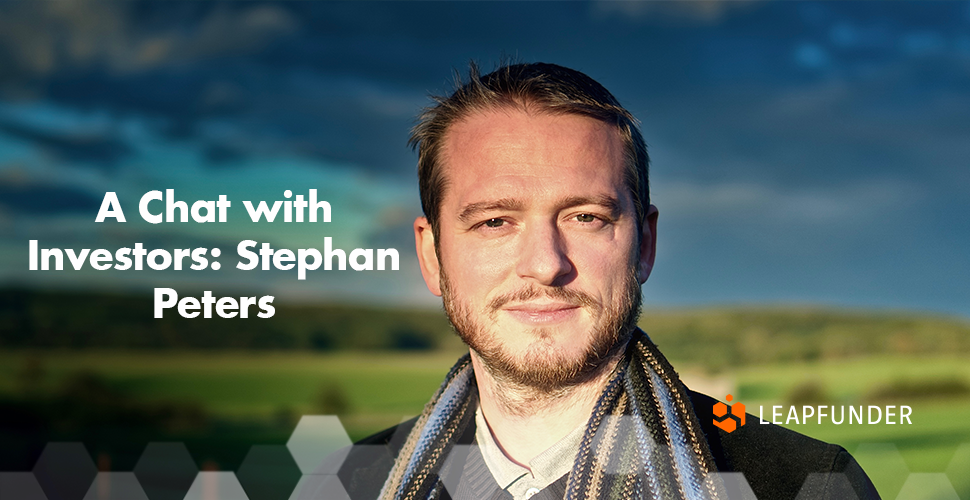Stephan Peters helps corporations and SMEs handle transformational change and implement high-growth strategies, specifically strategic revamps, new market entries, capital raising, commercial optimization, acquisitions, divestitures and partnerships, through his investment and advisory firm, SANZARU Group. He is a founder and a lead investor of MIZARU Ventures, an early-stage impact investment fund, offering fair financing while promoting diversity and gender balance in early-stage companies through a variety of approaches. Find out how he became an angel investor and what’s his advice for beginning startup investors.
An interview with Stephan Peters
1. Hi Stephan, thank you for agreeing to do the interview. Could you tell us a little bit about your background and how you became an angel investor?
Thanks for having me over! If I had to describe myself in a few words, I’d say I’m a jack of all trades and a master of some. After growing up in Belgium to entrepreneurial parents, I returned to the Netherlands to study aerospace engineering, which gave me an affinity to technology as well as a deep appreciation of the scientific method. After doing stints in investment banking, management consulting and private equity covering four continents as well as finishing my MBA, I decided to re-connect with my entrepreneurial roots and start my own advisory and investment company.
Along the way, I did my first angel investment back in 2010 to support a former colleague and friend whom I admired for his commercial drive and customer insights. Since then, I’ve expanded my angel investments to a portfolio of 12 live companies. I thoroughly enjoy helping entrepreneurs and business leaders succeed by sharing my experience and know-how. More recently, I have become more active as an impact investor with the aim of fomenting social and environmental change by providing advice and financing to purpose-driven ventures.
2. As an investor, you must have met a lot of entrepreneurs. What are some of the most innovative ways you’ve seen entrepreneurs create impact?
Entrepreneurs are infinitely creative in how they use limited resources to tackle problems they themselves are deeply familiar with. They search for solutions that are most likely to take hold given the cultural or social circumstances in what are usually niche markets. A few amazing examples I’ve come across include Apopo, Auticon and SamaSource. Apopo trains rodents to find landmines (without triggering them) as well as diagnose tuberculosis. They managed to create a highly reliable and cheaper solution to both problems. Auticon employs autistic adults to use their exceptional strengths as IT and compliance consultants by providing them with autism-friendly work environments. They have been so successful that big IT firms have started to mimic their activities. SamaSource offers IT and data outsourcing services by training and employing poverty-stricken people in Africa and Asia. These companies are remarkable examples of how entrepreneurship can lead to a better future, and on how there is not necessarily a trade-off between financial return and social and/or environmental return.
3. Do you have specific criteria that must be fulfilled before you invest in a company or is it just pure gut feeling? Would you say you invest more in ideas or teams?
Typically, I look at key elements such as team, idea, business model, timing and funding momentum. Of these, I think timing and team are the most important.
Timing is all about whether the market or customers are ready for what you’re offering, while the team includes factors such as the background and experience of the entire staff, whether there are skills gaps on the team, or whether the founders demonstrate critical thinking skills and generate data-driven insights while leveraging external advice.
Why do I think the idea or the business model is not necessarily the most important? Georges Doriot, the Harvard Business School professor and co-founder of INSEAD, and widely considered the first venture capitalist described it very succinctly: he would rather invest in a B venture with an A team than in an A venture with a B team. For me, it boils down to how well the team can execute and how resilient they are when things go wrong.
Ultimately, a strong team will expand into or pivot towards a good idea with a viable business model along the way.
4. What was your biggest success and your biggest failure as an angel investor? Do you have some advice for beginning startup investors?
I guess I’ve been lucky so far with my angel investments. I’ve had one successful exit with a decent return and only one soon-to-be failure after investing in a total of 14 startups.
Most of my regrets derive from situations when I was not as pro-actively involved as I originally intended in coaching the entrepreneurs to spot potential problems before they occur. Some of those situations were unavoidable; many could have benefited from more frequent updates between founders and investors to help flag issues early.
For beginning investors, I would share two key pieces of advice:
- Be humble: Understand your strengths and weaknesses. Don’t give your portfolio companies uninformed advice or at least activate your network to find relevant expertise. Stay curious and keep learning. Hubris comes before the fall.
- Be cautious: Invest in what you know and resist being pulled into hypes. Invest small tranches of capital and reserve firepower for follow-ons into your portfolio companies. Co-invest with angel investors you trust and respect. It’s a marathon, not a sprint.
Thank you for your insights, Stephan! We wish you the best of luck in your future endeavours!


